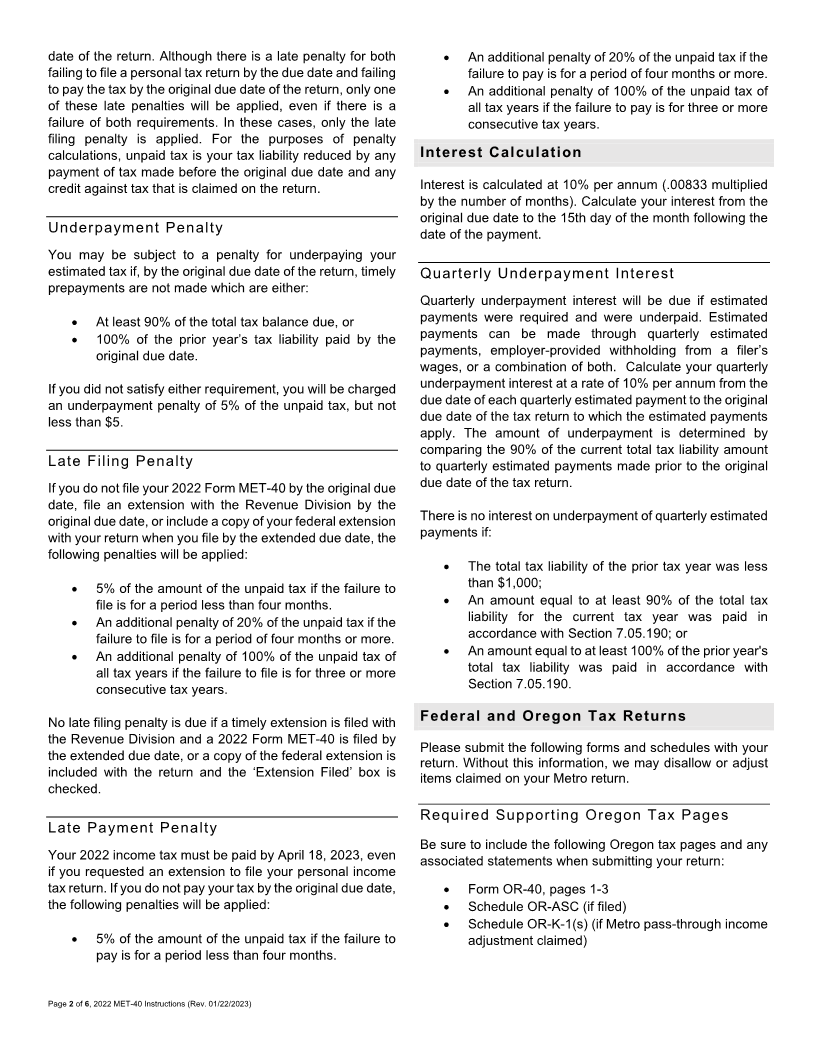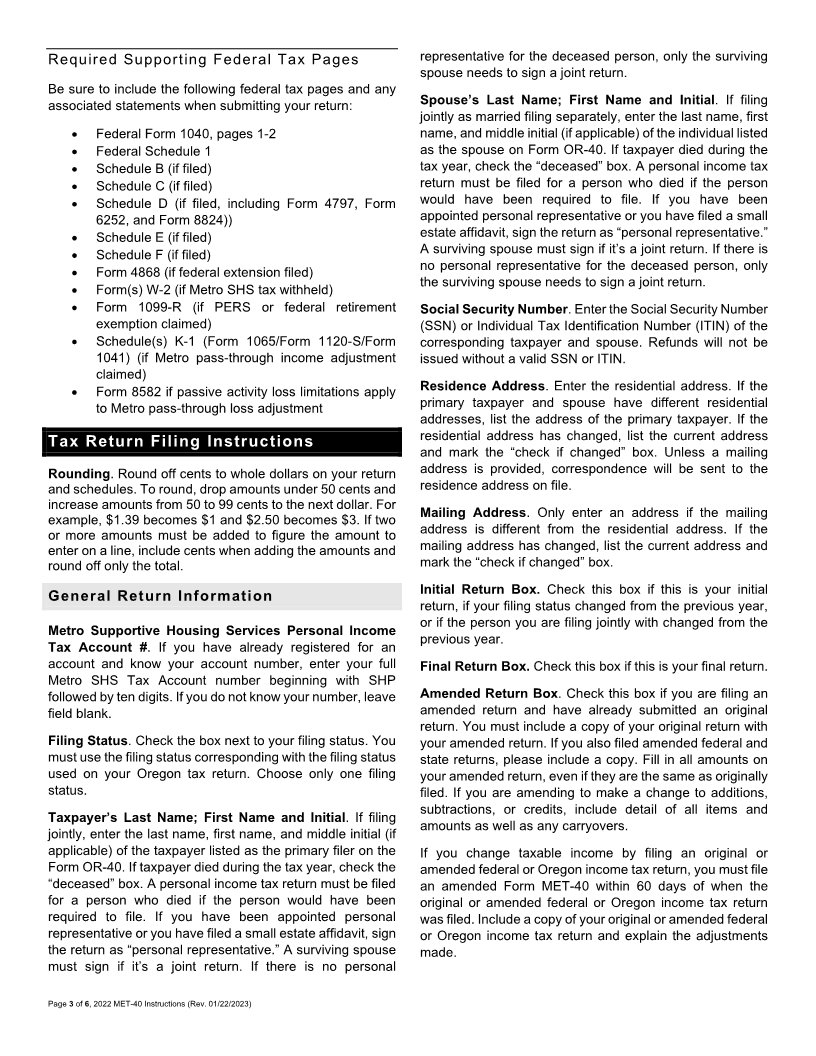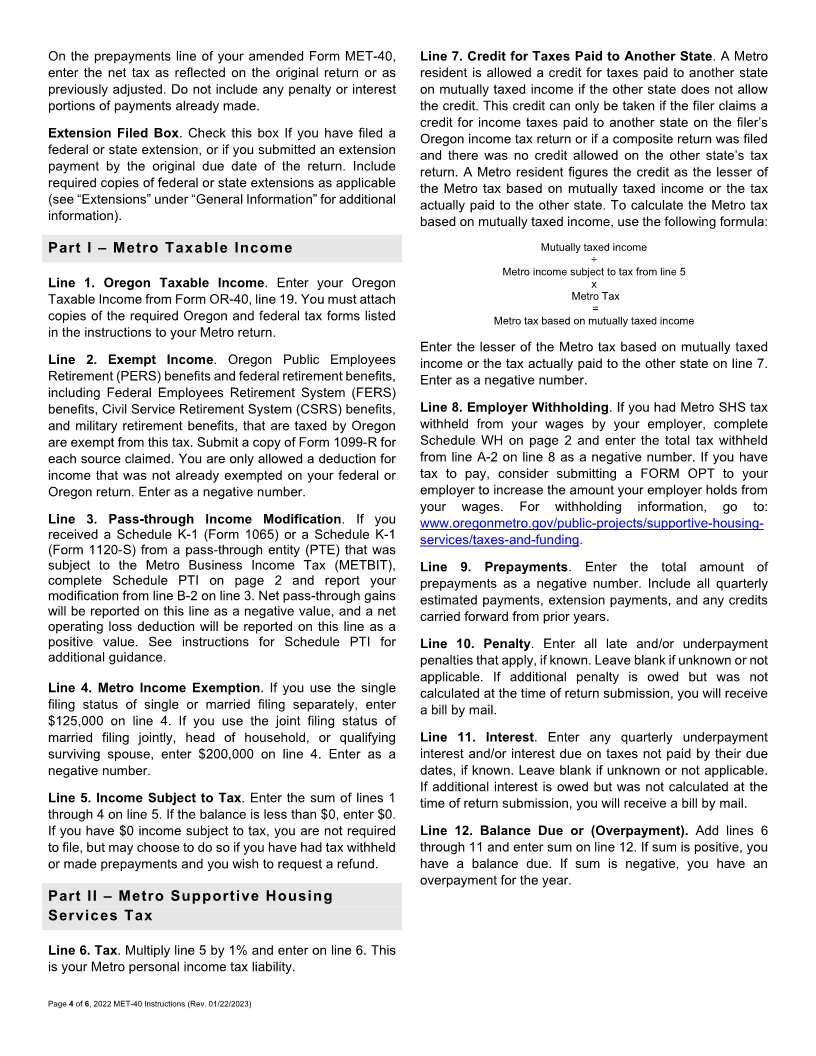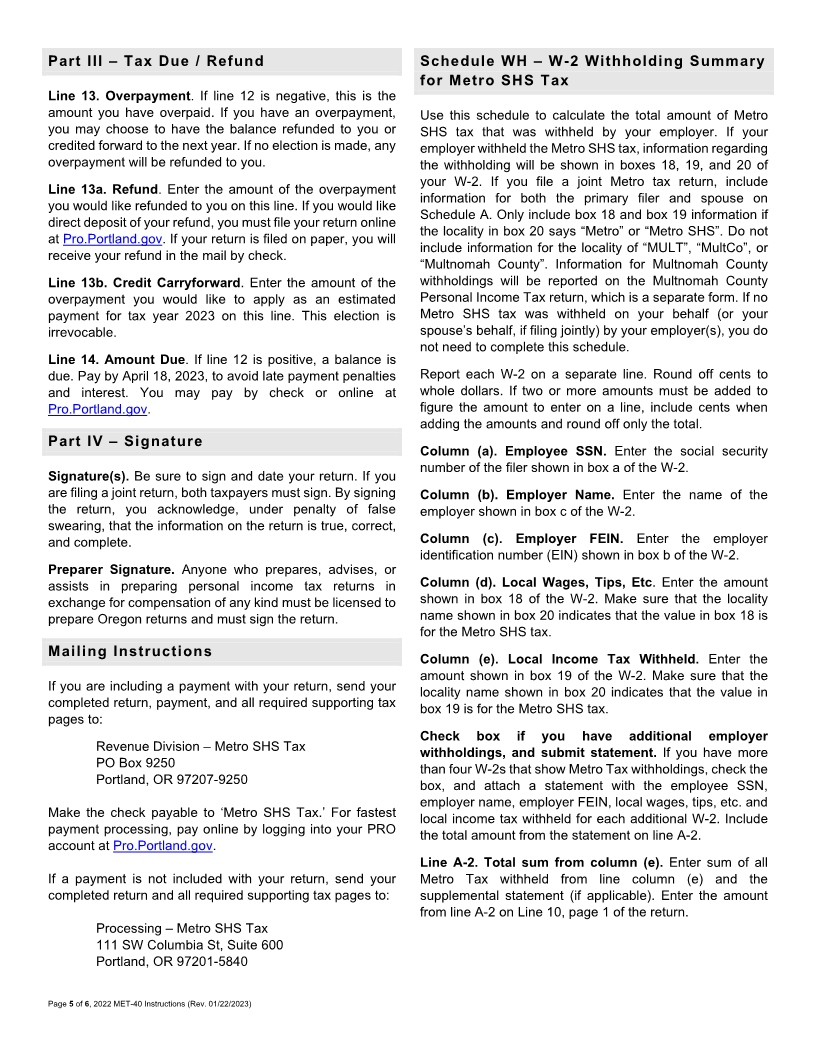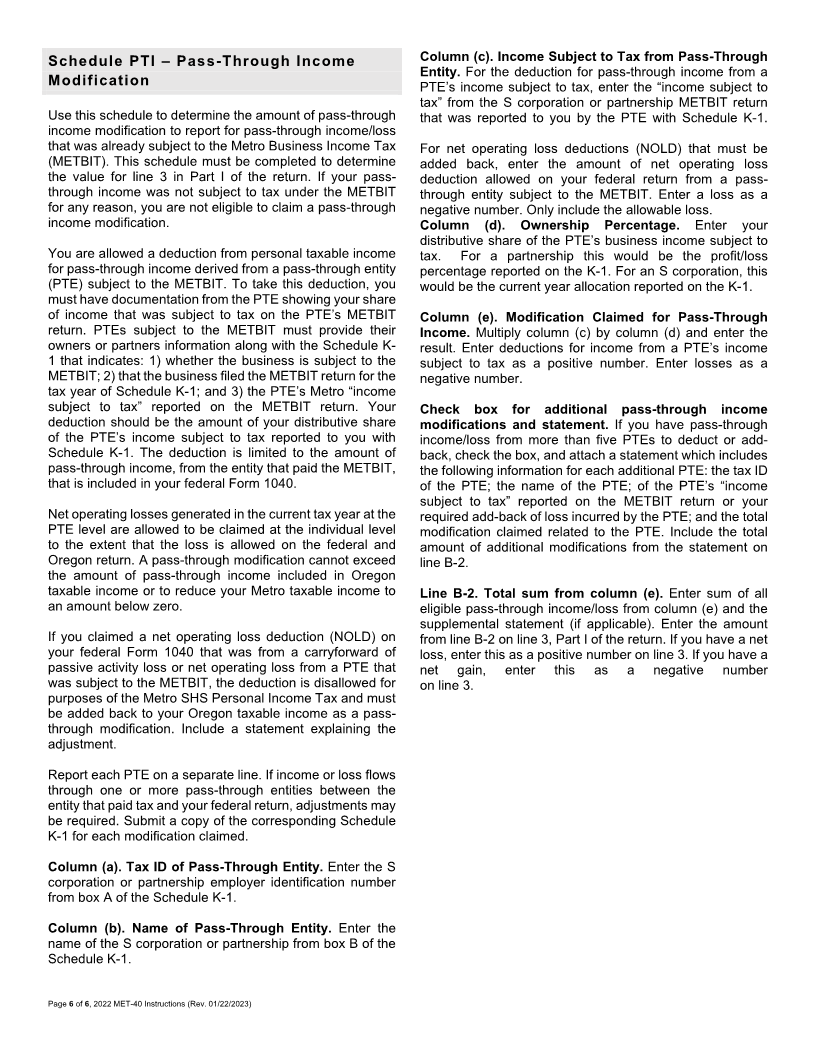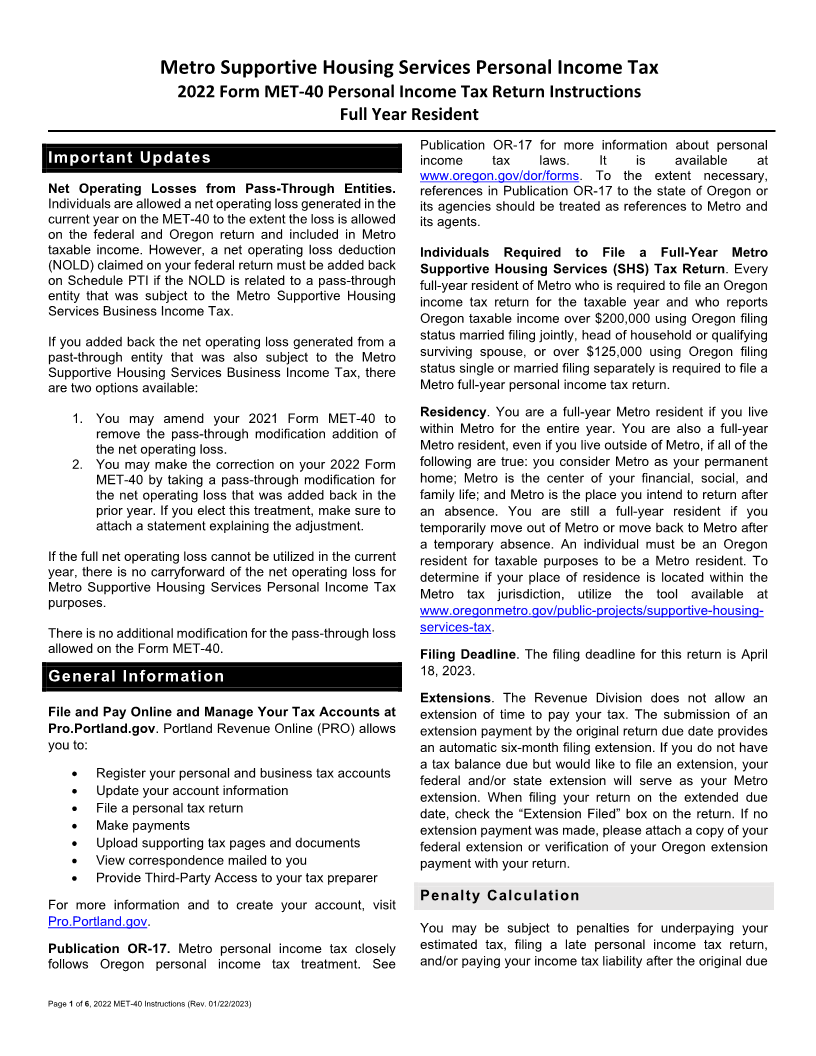
Enlarge image
Metro Supportive Housing Services Personal Income Tax
2022 Form MET-40 Personal Income Tax Return Instructions
Full Year Resident
Publication OR-17 for more information about personal
Important Updates income tax laws. It is available at
www.oregon.gov/dor/forms. To the extent necessary,
Net Operating Losses from Pass-Through Entities. references in Publication OR-17 to the state of Oregon or
Individuals are allowed a net operating loss generated in the its agencies should be treated as references to Metro and
current year on the MET-40 to the extent the loss is allowed its agents.
on the federal and Oregon return and included in Metro
taxable income. However, a net operating loss deduction Individuals Required to File a Full-Year Metro
(NOLD) claimed on your federal return must be added back Supportive Housing Services (SHS) Tax Return. Every
on Schedule PTI if the NOLD is related to a pass-through full-year resident of Metro who is required to file an Oregon
entity that was subject to the Metro Supportive Housing income tax return for the taxable year and who reports
Services Business Income Tax.
Oregon taxable income over $200,000 using Oregon filing
status married filing jointly, head of household or qualifying
If you added back the net operating loss generated from a
past-through entity that was also subject to the Metro surviving spouse, or over $125,000 using Oregon filing
Supportive Housing Services Business Income Tax, there status single or married filing separately is required to file a
are two options available: Metro full-year personal income tax return.
1. You may amend your 2021 Form MET-40 to Residency. You are a full-year Metro resident if you live
remove the pass-through modification addition of within Metro for the entire year. You are also a full-year
the net operating loss. Metro resident, even if you live outside of Metro, if all of the
2. You may make the correction on your 2022 Form following are true: you consider Metro as your permanent
MET-40 by taking a pass-through modification for home; Metro is the center of your financial, social, and
the net operating loss that was added back in the family life; and Metro is the place you intend to return after
prior year. If you elect this treatment, make sure to an absence. You are still a full-year resident if you
attach a statement explaining the adjustment. temporarily move out of Metro or move back to Metro after
a temporary absence. An individual must be an Oregon
If the full net operating loss cannot be utilized in the current resident for taxable purposes to be a Metro resident. To
year, there is no carryforward of the net operating loss for determine if your place of residence is located within the
Metro Supportive Housing Services Personal Income Tax
Metro tax jurisdiction, utilize the tool available at
purposes.
www.oregonmetro.gov/public-projects/supportive-housing-
There is no additional modification for the pass-through loss services-tax.
allowed on the Form MET-40. Filing Deadline. The filing deadline for this return is April
18, 2023.
General Information
Extensions. The Revenue Division does not allow an
File and Pay Online and Manage Your Tax Accounts at extension of time to pay your tax. The submission of an
Pro.Portland.gov. Portland Revenue Online (PRO) allows extension payment by the original return due date provides
you to: an automatic six-month filing extension. If you do not have
a tax balance due but would like to file an extension, your
• Register your personal and business tax accounts
federal and/or state extension will serve as your Metro
• Update your account information
extension. When filing your return on the extended due
• File a personal tax return date, check the “Extension Filed” box on the return. If no
• Make payments extension payment was made, please attach a copy of your
• Upload supporting tax pages and documents federal extension or verification of your Oregon extension
• View correspondence mailed to you payment with your return.
• Provide Third-Party Access to your tax preparer
Penalty Calculation
For more information and to create your account, visit
Pro.Portland.gov. You may be subject to penalties for underpaying your
Publication OR-17. Metro personal income tax closely estimated tax, filing a late personal income tax return,
follows Oregon personal income tax treatment. See and/or paying your income tax liability after the original due
Page 1of ,62022 MET-40 Instructions (Rev. 01/22/2023)
